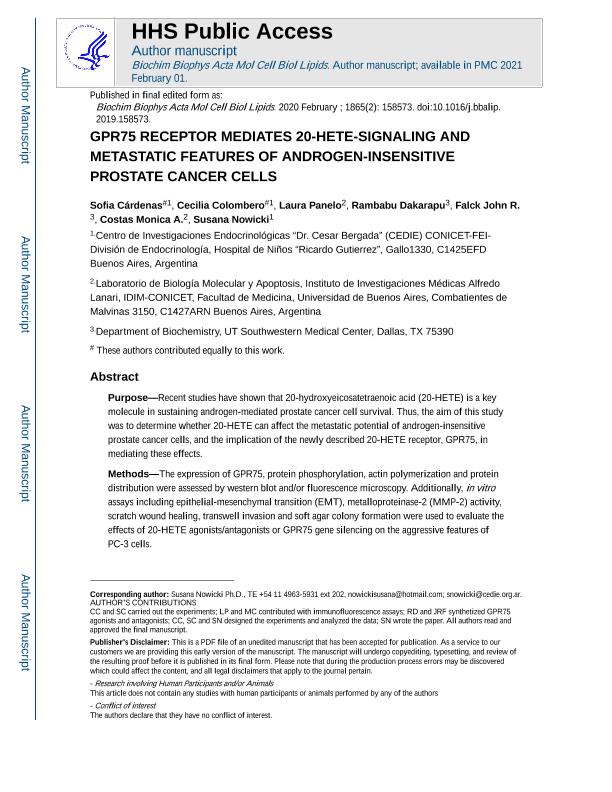Artículo
GPR75 receptor mediates 20-HETE-signaling and metastatic features of androgen-insensitive prostate cancer cells
Cardenas Alcoser, Elena Sofia; Colombero Rivas, Cecilia Edith ; Panelo, Laura Carolina
; Panelo, Laura Carolina ; Dakarapu, Rambabu; Falck, John R.; Costas, Monica Alejandra
; Dakarapu, Rambabu; Falck, John R.; Costas, Monica Alejandra ; Nowicki, Susana
; Nowicki, Susana
 ; Panelo, Laura Carolina
; Panelo, Laura Carolina ; Dakarapu, Rambabu; Falck, John R.; Costas, Monica Alejandra
; Dakarapu, Rambabu; Falck, John R.; Costas, Monica Alejandra ; Nowicki, Susana
; Nowicki, Susana
Fecha de publicación:
02/2020
Editorial:
Elsevier Science
Revista:
Biochimica Et Biophysica Acta - Molecular and Cell Biology of Lipids
ISSN:
1388-1981
Idioma:
Inglés
Tipo de recurso:
Artículo publicado
Clasificación temática:
Resumen
Purpose: Recent studies have shown that 20-hydroxyeicosatetraenoic acid (20-HETE) is a key molecule in sustaining androgen-mediated prostate cancer cell survival. Thus, the aim of this study was to determine whether 20-HETE can affect the metastatic potential of androgen-insensitive prostate cancer cells, and the implication of the newly described 20-HETE receptor, GPR75, in mediating these effects. Methods: The expression of GPR75, protein phosphorylation, actin polymerization and protein distribution were assessed by western blot and/or fluorescence microscopy. Additionally, in vitro assays including epithelial-mesenchymal transition (EMT), metalloproteinase-2 (MMP-2) activity, scratch wound healing, transwell invasion and soft agar colony formation were used to evaluate the effects of 20-HETE agonists/antagonists or GPR75 gene silencing on the aggressive features of PC-3 cells. Results: 20-HETE (0.1 nM) promoted the acquisition of a mesenchymal phenotype by increasing EMT, the release of MMP-2, cell migration and invasion, actin stress fiber formation and anchorage-independent growth. Also, 20-HETE augmented the expression of HIC-5, the phosphorylation of EGFR, NF-κB, AKT and p-38 and the intracellular redistribution of p-AKT and PKCα. These effects were impaired by GPR75 antagonism and/or silencing. Accordingly, the inhibition of 20-HETE formation with N-hydroxy-N′-(4-n-butyl-2-methylphenyl) formamidine (HET0016) elicited the opposite effects. Conclusions: The present results show for the first time the involvement of the 20-HETE-GPR75 receptor in the activation of intracellular signaling known to be stimulated in cell malignant transformations leading to the differentiation of PC-3 cells towards a more aggressive phenotype. Targeting the 20-HETE/GPR75 pathway is a promising and novel approach to interfere with prostate tumor cell malignant progression.
Palabras clave:
20-HETE
,
Prostate cancer
,
GPR75 receptor
,
Metastasis
Archivos asociados
Licencia
Identificadores
Colecciones
Articulos(IDIM)
Articulos de INST.DE INVEST.MEDICAS
Articulos de INST.DE INVEST.MEDICAS
Citación
Cardenas Alcoser, Elena Sofia; Colombero Rivas, Cecilia Edith; Panelo, Laura Carolina; Dakarapu, Rambabu; Falck, John R.; et al.; GPR75 receptor mediates 20-HETE-signaling and metastatic features of androgen-insensitive prostate cancer cells; Elsevier Science; Biochimica Et Biophysica Acta - Molecular and Cell Biology of Lipids; 1865; 2; 2-2020
Compartir
Altmétricas



